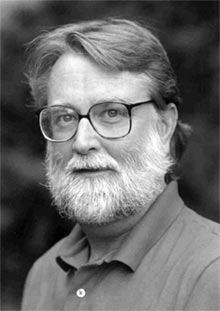|

Race talkin' with Jim Hughes
2/7/03
 |
| Dale Wilson is a
bracket racing "retiree" who was editor
of Bracket Racing USA from 1991 to
its demise in 1998. His latest dream
is to return to racing in either a
front-engine dragster, a slow motorcycle
or the family Mazda wagon. Everything
else he has is for sale. |
|
Jim Hughes, of Phoenix, Arizona, is the 2002 NHRA Super Comp world champion. An owner of Hughes Performance, a maker of racing transmissions and converters, Jim, 43, put his 20-plus years of converter and trans building to good use when he secured the S/C crown at the final race of the season, the World Finals at Pomona, where he and fellow Hughes Performance teammate Todd Stephens went deep in eliminations, Jim going out in the semis and Todd getting runner-up in Super Gas, thus securing his own world championship crown.
Hughes and his three kids, Amanda, Jake and Joey, plus wife Beth, are a racing family (Amanda, 16, will get a chance at shoeing one of the Hughes dragsters later this year). And although the Hughes name has been around in the trans and converter business for three decades, it was a then-17-year-old Jim Hughes who went to father Bill and convinced him there was a market for racing converters and transmissions. Now Jim shows up at the races with four cars in tow, two dragsters and two Super Gas Vette Roadsters. They serve two purposes. "The motorsports race team provides the test vehicles to evaluate and market the performance line of converters and transmissions," Hughes says. And of course, they want to win races.
Hughes started at the bottom, working in the shop opening converters and washing parts. Over the past 10 years, he has focused on converter and trans R&D. I had a few questions for him and want to share the answers with you.
Q: How did Hughes
Performance get started?
Jim Hughes: My
dad, Bill, has always been in the converter
business, and he started the company with my
mom Lorraine Hughes in 1969, when we moved to
Phoenix. The company made mostly OEM converters.
He did a few converters for local racers, and
he began getting into the racing end of things.
When I was in high school in 1974, I started
working with him part-time, and in 1977, I got
my first race car, a '65 Chevelle, and that's
when I took an interest in converter technology
and design and started building more performance
converters and trying them on my own car. At
that time, we did 90 percent OEM and 10 percent
performance. Over the years, I felt we had an
opportunity to hit more of the performance market,
and now it's the other way around --- 90 percent
performance, and the OEM hasn't fallen off.
Q: How many world champions do you have in your stable?
JH: Probably 12, including Ed Richardson, Mike Henderson, Sheldon Gecker, Todd Stewart, John Asta, John Woods, and others.
Q: Do you catch any heat from your fellow competitors as a manufacturer racing against your customers?
JH: I don't feel
that I catch any heat from fellow competitors.
If anything, I believe our performance on the
track and willingness to help others shows the
love and dedication we have for racing. The
old saying of everyone hates a winner I don't
think is really true. Look at the Richardson
brothers or John Force --- their competitors
don't hate them. I think they call that respect.
And would you buy your performance parts from
a loser?
Q: How many races will you attend to defend your crown in 2003?
JH: Our schedule is flexible when we plan our
race season around different parts of the country
to meet new customers and set up new distribution
dealers. It's tough to get in a full schedule
because we can't hit all of the eight division
races required for NHRA or IHRA. My tow rig,
a 36-foot trailer that is owned by Donny Peaden
of Country Motors in Edenburg, Illinois, will
hold four race cars. We're an NHRA and IHRA
major sponsor, and that's how we go out and
promote our products --- by being at the track
and having an open pit format so that the customers
can freely come up to our trailer and ask questions.
NEXT
PAGE >>
|